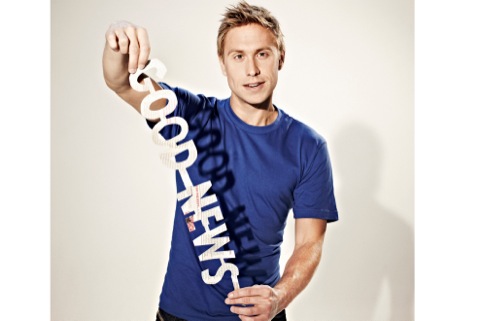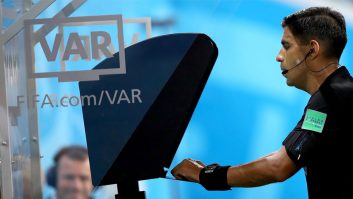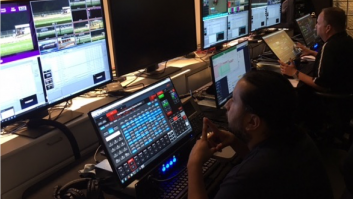
Avalon and Hat Trick have made proposals to buy BBC Three, following the announcement from the corporation that the channel would be moved online. The BBC Trust has yet to respond to the offer. Hat Trick’s productions include Have I got News for You, while Avalon has produced Russell Howard’s Good News (pictured), both for BBC Two.
Managing directors Jon Thoday of Avalon and Jimmy Mulville of Hat Trick have reportedly written to the BBC Trust offering £100 million for the channel. This is in stark contrast to the budget cuts for the channel which were revealed by director general Tony Hall last year. Kavanagh raised the budget cut in his blog post, explaining it as ‘a decision to move £30 million from BBC Three to BBC One drama’ in order to ‘develop these shows and make new shows we know young people will love.’
In a statement Avalon/Hat Trick confirmed their approach to the BBC Trust regarding a purchase of BBC Three and commented: ‘Under the new ownership, BBC Three would continue to broadcast on all digital platforms, all current contracts would be honoured and the channel’s programme budget would be increased from £81m to £100m a year’ and continued: ‘All original commissions would be made by UK companies and the channel would continue to be aimed at a young and ethnically diverse audience.’
Damien Kavanagh, controller, BBC Three responded to questions yesterday in a list of answers in a BBC blog post: the first of these stated clearly: ‘BBC Three is not closing and BBC Three is not for sale.’ The BBC Press office took to Twitter to confirm this, posting: ‘BBC Three not for sale because it’s not closing – proposal to move it online is part of bold move to reinvent BBC’s offer for young people.’
BBC Three reported an £85 million spend on programmes, working out as 6.6p per hour for each viewer. The channel has a weekly audience of 13 million viewers: almost a third of all 16 to 34-year olds. If the bid were to be accepted the channel could be saved from becoming an online-only offering, though it would also mark the first time a BBC public service has been purchased by a private company. It would also mean that the privately-owned BBC Three would lose its slot on the second page of TV programming guides, which it gets in exchange for its public service obligations.
In his blog post Kavanagh also clarified further details of the channel’s future: including that the series In The Flesh would not be re-commissioned and that BBC Three only had the budget to produce one drama per year. ‘We would make content for the places they [younger audiences] are on’ added Kavanagh, giving Snapchat, What’s App, Tumblr and Facebook as examples of possible platforms. At the time of the original BBC Three announcements in March last year, the BBC’s media correspondent David Sillito said: “The detail is yet to be worked out. They’re going to hang onto the brand, but it won’t be a channel.” Without a linear schedule or broadcasting on a TV channel, it is still unclear what the future of BBC Three will look like. Kavanagh seems to reiterate this point, saying that audiences would be consulted ‘to help define what we make’.
Despite the BBC’s confirmation that the channel is not for sale, the offer raises interesting questions about the future of the public service broadcaster, particularly in light of recent budget cuts and, with the potential of another Conservative-led government, cuts to the license fee.







